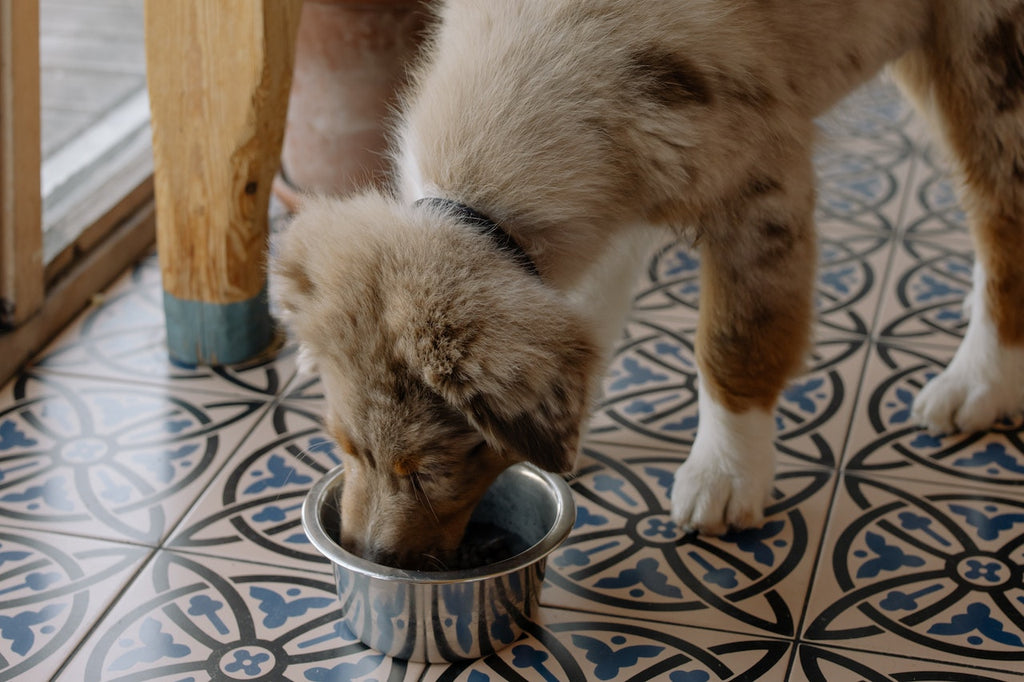Stressed Dog Body Language: Top 10 Signs
Posted by Jeffrey Powers on
Have you noticed your dog’s behavior changing? Are they acting out or seem clingy, tense, or distant?
Our dogs get stressed just like we do, and it might be causing these changes.
While it would be fantastic if our dogs could speak to us and let us know what’s wrong, that’s not going to happen. Luckily, their body language is the next best thing.
Is Your Dog Stressed? 10 Stressed Dog Body Language Signs
Your dog’s primary source of communication is their body language, which is why we must understand what they’re trying to say.
Learning how our dogs communicate can prevent dangerous situations and help reduce their anxiety.
These ten signs of stressed dog body language will help you decode their message:
Wide Eyes
It’s no secret that dogs communicate with their eyes — the puppy dog eye trick works on all of us.
However, their eyes can also show stress. If you notice your pup baring the whites of their eyes, it’s a telltale sign of stress.
They might look side-to-side with their wide eyes, showing that something is scaring or bothering them.
Ear Position
While the shapes of dog ears vary from breed to breed, stress will make any of them react in one of two ways.
Their ears might perk up and appear rigid when feeling stressed, or (more commonly) you’ll notice your pup’s ears pulled back, laying flat against their head.
Paying attention to their typical position will help you notice if their ears perk up or fall back, both of which indicate stress.
Mouth Movements
Many dogs will show their teeth while they play, but if you see their lip curling, it’s an early sign of aggression.
If you notice that curl, you need to help curb your dog’s stress before it turns into a snarl, snap, and bite. You may also notice their whiskers stand on end when stressed.
Watch your pup while he or she plays — if you notice a change from the showing of teeth to a dramatic lip curl, they are stressed and may resort to aggressive behavior if you don’t take care of the stressor.
Vocalization
Some breeds bark more than others, but unexplained, abnormal barking shows stress; this is especially true for dogs with separation anxiety.
You may also notice growling, whimpering, whining, or excessive panting.
All of these are common indicators of doggy anxiety, meaning something is causing them stress.
Related: How to Calm a Hyper Dog

Appetite
Stress surrounding food scarcity isn’t uncommon in dogs, especially in rescues that may have gone hungry before — you’ll notice this if your dog eats unusually fast.
Doggy stress can also cause a decrease in appetite or gastrointestinal issues like constipation or diarrhea. However, if you notice stomach issues in your pup, we recommend visiting the vet.
Licking
Have you ever been walking your dog when you stopped to talk to someone else and noticed that, when your eyes turn to your dog, they decide that’s the best time to clean themselves?
Well, prolonged gazing can cause anxiety in dogs; they’re not trying to embarrass you; it’s a natural reaction to stress.
If you notice your dog constantly licking itself in the same spot, often causing pinkish-brown stains on their fur, it’s likely due to stress from boredom.
Tail Position
Most dog parents know that if their pup’s tail is between their legs, they’re stressed about something. But not every dog uses this particular body language sign.
Their tail might be between their legs or positioned straight down, but if it abandons its normal position, it’s probably because of stress.
Yawning
When we yawn, it’s usually because we’re tired, so it’s not uncommon to believe the same about our dogs. However, dogs yawn for various reasons, including:
- To show indifference
- To deflect a threat
- To calm themselves
- To indicate emotion
In addition, stressed dogs can experience a rise in cortisol levels — in this case, they may yawn in an effort to offset the sudden increase in body temperature.
Sweaty Paws
We get sweaty palms when we become stressed, and our dogs are no different: They get sweaty paws. Interestingly, your dog’s paws are the only area they can produce sweat.
And often, when you notice their sweaty paws, they are either nervous, stressed, or both.
Freezing
If you see your dog suddenly become stiff or freeze in place, they likely heard or saw something that caused them stress. In these cases, your pup can’t handle the current situation; it’s a reaction to try to avert a threat.
On the other hand, freezing can also be a warning that something is about to escalate to aggression. Either way, if you see your dog is uncomfortable, don’t push them — it will only increase their stress.

How to Calm Down Your Stressed Pup
No one is more loyal and loving than our dogs, but they get anxious and stressed, similar to humans. And learning to keep them calm is crucial for their happiness and health.
So, try one of these strategies to help calm down your stressed pup:
- Keep a consistent schedule. Dogs like consistency; they’re creatures of habit. Keeping bedtime, playtime, exercise routines, and feeding schedules predictable can help them feel comfortable.
- Keep them mentally stimulated. Your dog needs physical exercise, but they also need mental stimulation. You can do this with puzzle toys, training sessions, or by going on doggy dates.
- Try music therapy. Music and white noise can help calm your dog down when he or she experiences anxiety. It provides a calming environment and can also drown out noises like fireworks or thunder that trigger anxiety.
- Give them natural supplements. CBD pet products are a natural option to help your pup get quick relief from anxiety and stress. It’s safe for healthy dogs to take daily, and research shows that a single dose can reduce doggy stress.
Thinking of trying CBD to help calm down your stressed doggy? We formulate our calming CBD chews to take away their anxiety.
Related: Hemp vs. CBD for Dogs
